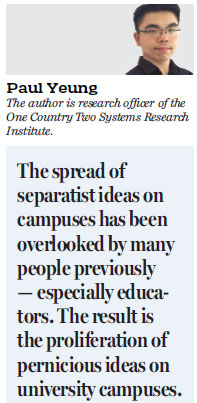Teachers have a role in stopping separatism
Updated: 2017-09-28 05:51
By Paul Yeung(HK Edition)
|
|||||||||
Paul Yeung says educators have a responsibility to help students learn knowledge and skills - and not be exposed to extreme political ideas
The new school day in September reminds us again that our students are also vulnerable. The issue of "Hong Kong independence" raised public concerns on Sept 4 as banners calling for Hong Kong's independence surfaced at the Chinese University of Hong Kong campus the night before the starting day of the new academic year. This incident suggests that advocates of such law-breaking political pursuits will not leave our students alone.
Displaying separatist banners is not academic discussion in any sense - rather it is a clear political statement promoting separatism in Hong Kong. Winnie Tam Wan-chi, former Bar Association chairwoman, has rightly warned that actions advocating Hong Kong breaking away from the nation could violate the city's Crimes Ordinance. Arguments about "freedom of speech" and "academic freedom" simply cannot cover up the illegality of such political endeavors.

Freedom is not without its boundaries. We should remember philosopher John Stuart Mill's "harm principle" expressed in On Liberty: "The only purpose for which power can be rightfully exercised over any member of a civilized community, against his will, is to prevent harm to others." By extension, the exercise of one's rights and freedoms must in no way inflict any harm on other members of society.
Advocating and campaigning for "Hong Kong independence" will inevitably split Hong Kong society. It may lead to violence and cause damage to property and people.
Advocacy of separatism is illegal and unconstitutional. It is also divisive; it could easily lead the city into an abyss if left unchecked. This dreadful scenario is looming. According to a recent poll conducted by the Centre for Communication and Public Opinion Survey under the CUHK, 19 percent of respondents from the age group of 15-39 indicated their support for the idea of Hong Kong gaining independence after 2047; whereas only 7 percent of those from the age group of 40 and above said "yes". It is logical to believe that any further spread of extreme political ideas among students could only lead to more conflict between the older and younger generations.
Already, we have witnessed conflicts arising from the advocacy of separatism in the community. For example, in the CUHK campus, some local and mainland students openly confronted each other over posters advocating independence for Hong Kong.
A female student from the mainland, who was captured on film tearing down posters promoting "Hong Kong independence", said she had been living in fear after becoming a target of cyberbullying in Hong Kong. She said some internet users in the city warned her "not to step out of her room". Tolerance is a virtue most of the time, but definitely not when it comes to the advocacy of separatism. It takes more than one chilly day for the river to freeze, as an old Chinese saying goes.
The idea of "Hong Kong independence" was first raised by Chin Wan, a localist academic, back in 2011. But it was brought to the public's attention only in 2014 when University of Hong Kong student magazine Undergrad published an article titled "Hong Kong Nationalism". The spread of separatist ideas on campuses has been overlooked by many people previously - especially educators. The result is the proliferation of pernicious ideas on university campuses.
This time round, administrators of the relevant tertiary institutions seem to have taken the issue seriously. Professor Joseph Sung Jao-yiu, vice-chancellor of CUHK, said students were free to express their opinions but should not break the law. The heads of 10 tertiary learning institutions have issued a joint statement condemning the abuse of freedom of expression on campuses and reiterating their objections to the advocacy of "Hong Kong independence". This is no doubt a good first step from them in accepting their responsibilities as educators.
However, we have yet to see similar moves or comments from teachers who have more direct contact with students. The Hong Kong Professional Teachers' Union, which is the largest teachers' trade union in Hong Kong, has so far taken a lenient attitude toward the advocacy of separatism. They are even more vigorous in protecting academics who advocate "Hong Kong independence" ideas on campus. We need to heed the classical Confucian book, Three Character Classic, or Sanzijing, which warns us: "A child is better unborn than untaught; and the teacher is to be blamed if the student fails to behave."
For the sake of our young people and the city, our teachers who are generally highly respected in society should take their responsibilities very seriously. They must help our students learn to distinguish between right and wrong.
(HK Edition 09/28/2017 page8)